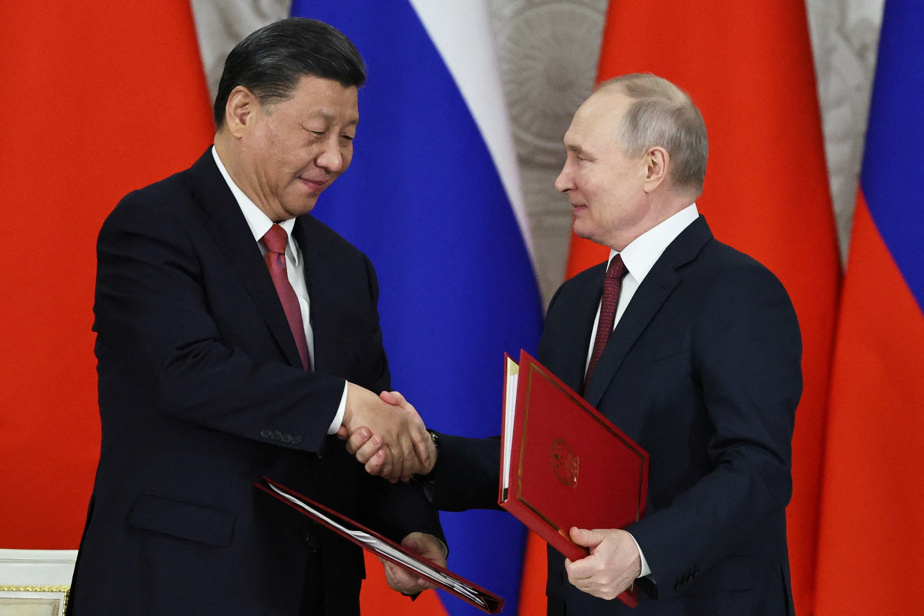(Paris) The Chinese president arrived in Moscow this week in a position of mediator between Russia and Ukraine. But Xi Jinping has instead signaled his strong support for Russian President Vladimir Putin in the face of Westerners who are trying to isolate him.
After his third re-election as head of China, Xi Jinping booked his first state visit for the Kremlin chief. A highly symbolic trip that strengthened ties between the two leaders and undermined Beijing’s alleged neutrality in the conflict in Ukraine.
“ Xi’s visit emboldened Putin ”, summarizes Liana Fix, expert at the Council on Foreign Relations (CFR), an American think tank, pointing out that this visit took place a few days after the issuance by the International Criminal Court ( ICC) of an international arrest warrant for the Russian President.
This visit was “perceived by the non-Western world as a counterweight to the decision” of the ICC, continues Alexandre Baounov, expert from the Carnegie Foundation. It is “as if the Chinese leader had broken the curse on Putin”.
And proof that Xi wants to give pride of place to the Russian president: he has invited him to visit him in Beijing.
For the CFR expert, from Moscow’s point of view, this visit signals “ the implicit support — even if it is not proactive support from China — ” to continue to fight in Ukraine.
Sam Greene, director at the Washington-based CEPA Think Tank, agrees.
“ This is a gift for Putin – basically Beijing’s permission to continue fighting ”, he reacted on his Twitter account, while not excluding “ a surprise ” if Xi Jinping and the Ukrainian President Zelensky came to talk. For the time being, the interview, requested by Kyiv, has not been confirmed.
China has never applied Western sanctions against Moscow. It did not hesitate to increase its imports of hydrocarbons from Russia and to increase its economic interests in the neighboring country.
And his recent peace proposals have aroused much skepticism on the Western side.
For Antoine Bondaz, specialist in Chinese foreign policy at the Foundation for Strategic Research (FRS), “what is at stake today for China in the war in Ukraine is not Ukraine’s future. , she doesn’t care […] It’s the Sino-American rivalry and the desire to discredit Western countries ”.
The Chinese president’s trip “is anything but a distancing” vis-à-vis Moscow, he said.
For the time being, beyond the political signal from Beijing, which shares the same visceral hostility towards the United States with Moscow, the Sino-Russian partnership is working to the advantage of China more than Russia, experts believe.
“While Xi and Putin have many common interests, it seems increasingly clear that this is not a partnership of equals,” notes Jon Alterman, expert at the American think tank CSIS ( Center for Strategic and International Studies).
“ Putin needs Xi much more than Xi needs Putin ”, he adds, alluding to Russia’s increased dependence on its hydrocarbon exports to China, which have exploded since the start of the war and should further accentuated with the Force de Sibérie 2 gas pipeline project.
Ultimately, “Putin comes out of this visit strengthened in the short term, but more dependent on China in the long term”, sums up Tatiana Jean, director of the Russia/NIS center at the French Institute for International Relations (IFRI).
She observes that Beijing is in the current context “ the most valuable political and economic support for Russia ”. And “as long as she has his support, masked by the screen of China’s supposedly neutral position, she will be able to continue the war”.
However, Moscow, mired in the Ukrainian conflict, has so far failed to obtain military support.
China has not yet “crossed the line” of delivering lethal weapons to Russia in the midst of the war in Ukraine, US Foreign Minister Antony Blinken told the Senate on Wednesday.
For several weeks, American diplomacy has exerted intense diplomatic pressure on China to avoid such deliveries.
Antoine Bondaz does not believe “ not for a single moment that China will massively deliver armament systems to Russia ” at a time when Beijing intends to play the role of stabilizer “ with non-Western countries ”. Especially since it would expose itself to sanctions.
On a more optimistic note, some specialists like the independent expert Konstantin Kalachev believe that “the main thing is that this summit has reduced to zero the risks of an escalation of the conflict between Moscow and Kyiv towards a nuclear conflict” .
Because, he says, the Russian president is not going to risk “disappointing his main partner, Xi, who ensures his survival”.

